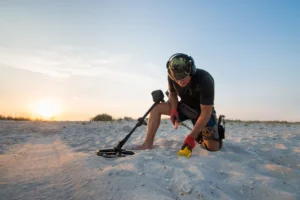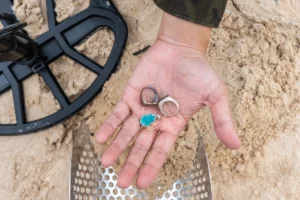Metal detecting has been practiced since the early 20th century, and the technology has made great strides since the first detectors were invented. With today’s advanced, lightweight machines and the sky-high prices of gold, detecting has potential not only as a fun hobby, but a great side hustle. Considering that gold is currently valued at $2,310 per ounce (as of June 7th, 2024), finding some buried treasure sounds better than ever!
Beaches are among some of the best places to look for precious metals, and Florida seems to be particularly popular. The Treasure Coast, for example, has been a draw for beachcombers and scuba divers for decades. In 1715, a group of loot-laden Spanish ships known as the Treasure Fleet were sunk by a hurricane. Treasure from the fleet was first recovered off the coast in the early 1960s, and precious metal relics like gold coins are still found to this day!
But you don’t need to visit Florida to try your luck on metal detecting. Beaches all around the world are ripe for the scanning of potentially valuable artifacts. Saltwater can help break down metals, making objects easier to detect, and there are plenty of waterproof metal detectors available today.

How Do Metal Detectors Work?
Metal detectors work by transmitting an electromagnetic field from the detector’s search coil into the ground. Because all metals conduct electricity (to varying degrees), any metal object within the detector’s electromagnetic field will induce its own electromagnetic field in response. The detector’s search coil receives the feedback from the object and then alerts the user that a target has been found.
Metal detectors are great at detecting ferrous, aka iron-containing metals. Ferrous metals are generally magnetic and generate stronger electromagnetic signals, making them easier to detect than other metals – even if they’re buried deep in the ground!
On the other hand, precious metals like gold and silver are non-ferrous. So, can metal detectors detect gold?
Precious Metal Detectors
Although precious metals are non-ferrous, they’re still highly conductive, making them relatively easy to detect with the right tools. Certain metal detectors can even distinguish different precious metals. Metal detection technology has come a long way over the years, especially in terms of discrimination.
Discrimination refers to the detector’s ability to identify different objects based on how conductive they are, and whether or not they have ferrous properties. Some metal detectors can attribute ID numbers to different types of metals, so that the user can take the information and decide whether an object is worth digging up or not.
Gold Metal Detectors

All precious metals are valuable, but what if you’re only interested in gold? Gold enthusiasts are in luck. With a plethora of detectors designed specifically for gold hunting, hitting the jackpot has never been easier.
Gold metal detectors are designed to maximize the odds of finding gold in different environments, including mineral-rich soils and underwater settings. Gold metal detectors boast features that make them more sensitive to gold’s specific characteristics as a metal, like conductivity and frequency response. Many gold detectors operate at higher frequencies than standard metal detectors, so they can detect small gold nuggets and flakes. Some also have advanced settings to avoid overlooking small pieces of gold, while still ignoring non-gold metals.
Depth and Detectability
How deep can metal detectors detect? It depends on the detector itself, where you’re located and what you’re looking for. Standard metal detectors can range in depth capacity from a few inches to around two feet.
Certain metals are more easily detected than others. The more highly conductive a metal is, the easier it is to detect at a deeper level. Silver, for example, is more highly conductive than gold.
The size, shape and orientation of an object will also play a role in detectability. For example, large targets can be detected deeper than smaller ones. Round shapes like rings and coins can be detected deeper than longer, thinner shapes like nails. And objects lying flat are more easily detected than objects sitting vertically.

A Timeless Hobby
There are some pretty astonishing metal detection success stories from around the world that are fun to read about. The Staffordshire Hoard, the largest collection of Anglo-Saxon gold and silver metalwork ever found, is a prime example. The hoard was discovered by a metal detectorist in 2009 in a field near the village of Hammerwich in Staffordshire, England. A whopping 3,500+ items were found – including gold and silver objects, many of which were adorned with precious stones!
While you may not find the next Staffordshire Hoard, metal detection outings are a great way to get outside and stay active. Even if you don’t return with a bounty, the fresh air and exercise are priceless.
Scrapping Your Precious Metals
If you do end up striking gold with a detector and are looking to monetize your findings, a trusted precious metals refinery like Garfield will provide you with the highest possible payout in return. We accept gold and silver coins, jewelry and more!
With over 132 years in the precious metals industry, our cutting-edge refining technology results in higher yields of precious metals recovered, which ultimately means the best value for our clients. We take pride in keeping precious metals out of landfills and recirculating them back into the market, in turn reducing the demand for the mining of new metals. Not only could metal detecting be a fun and lucrative hobby, but a great way to help the planet!
Turn your metal detecting into precious metal investing! Get cash for your unearthed gold now – download a free shipping label today!

